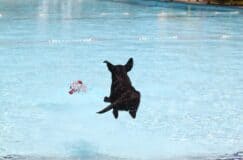How to prevent your Labrador from Digging
We know that digging can be harmful to people’s environments—and annoying, but, at the same time, digging for some dogs is an activity that keeps them balanced—its also their nature—either to hide food, make a den, or provide a cool place to lay. Digging is a form of exercise and distraction, and, for a dog, it can be simply a matter of boredom. It’s especially common if it’s in their breed to be diggers (such as terriers); when it’s part of their nature, they’ll often drain some of that extra energy by doing something that they are instinctually familiar with.
Human parents will bring their child to the playground and let them play in the sandbox, because digging is part of our nature as well. Today, we don’t use that ability often, but deep in our genes, we still crave it. Exercise is always the best way to drain any dog’s pent-up energy. Running with your dog, swimming with your dog, hiking with your dog – there are so many options.
So my question to you would be: do you know the energy levels of your dog’s breed and are you challenging them enough physically so that they don’t feel the need to dig, bark, jump, or chew? Are they exercising, and for how long? If it isn’t long enough, then I would recommend intensifying that exercise. If you don’t have enough time, that’s when I would recommend putting a backpack on them, which can help by turning 30 minutes of actual exercise into an hour.
- Diagnose the problem.If you can figure out why your dog is digging holes, your odds of changing the behavior will dramatically improve. Some digging is random and unable to be diagnosed, but usually there are discernible reasons for the behavior.
- Dogs often dig holes for one (or more) of these five reasons: entertainment, physical comfort, attention-seeking, escape, or prey-seeking. Watch when, where, and how your dog digs, and you can probably determine why he digs.
- Keep in mind that digging is a natural instinct for most dogs, and is unlikely to be completely stopped. Since some dogs have been bred to dig, research your breed before adopting them. If you know digging will be a major problem for you, investigate a dog breed’s propensity for digging before selecting a new pet.
Give your dog more attention. As many a dog-lover can attest, canines are not all that different from children in many ways, including a desire to get attention by whatever means necessary. Your dog may have learned that digging a hole in your nice garden gets attention from you, even if that attention is of the negative variety. If there are areas you want to prevent your dog from digging in them, fence them off. If you think this might be the case, ignore the dog after the digging and lavish your dog with attention for other, good behavior. Additionally, make sure your dog has plenty of time with you on other occasions. A happy dog won’t need to find attention in all the wrong places. Punishing your dog for digging by banishing her from your presence is likely to only exacerbate the behavior.
- Reduce your dog’s boredom.Dogs often dig for no other reason than simply because they are bored. Your dog may be bored if he stares at fences for a long time, whines, or engages in playful or “hyperactive” behavior, including digging holes. To stop your dog from being bored:
- Provide entertainment with toys and play time, especially if the dog is young and doesn’t have any other outlets. Rotate the toys every so often in order to keep the dog excited.
- Exercise your dog vigorously with walks or runs. Walk your dog at least twice a day, and consider playing fetch with a tennis ball launcher to really get him tuckered out. A tired dog is all you really need to stop the digging.
- Let your dog socialize with other dogs. Bring your dog to the dog park and let him sniff, saunter, and socialize to his heart’s content. Dogs are almost never bored when there are other dogs around.
- Provide appropriate chewing toys like Elk Antlers, (I use the ones from BARF World: http://www.barfworld.com/cgi-bin/product.cgi?category=29&af=1079) or other chews that they cannot “tear apart.” A 4 inch beef leg bone can entertain a dog for hours. Once the marrow is gone, you can add some raw peanut butter or cashew butter. Your local butcher should be able to provide you with these. Or you can obtain them from a high quality distributor like Hare Today Gone Tomorrow. (these are safe and won’t splinter, and will provide wonderful nutrition through the marrow contained in them. They will also help keep reduce and prevent tarter build-up on teeth)
Create safe discouragements. You have to catch the dog in the act of digging a hole if you want to effectively associate your disapproval with the activity. Since most of the digging is likely to happen while you’re not watching, you need to find ways to make the act of digging while you are not around a little bit less pleasurable for the dog.
- Remember: punishing the dog for digging after the fact will not solve the problem, and it could just worsen any anxiety that is causing the digging in the first place.
- Partially bury rocks in areas of frequent digging. They will make digging more difficult and less enjoyable. Larger, flat rocks work best, as they’re the hardest to move aside. Or, add heavy gravel to potty area or areas where your dog is left unattended.
- Bury chicken wire or chain-link fencing just under the surface of the dirt. The wire on the dog’s feet will feel uncomfortable. This usually works best near the fence, or around building foundations.
Try more unpleasant (but not harmful) discouragements if your dog continues to dig. If you’ve unsuccessfully tried to discourage your dog from digging the polite way, it may be time to step up your tactics. Here are some less pleasant ways of discouraging your dog from digging.
- Some dogs hate the smell of their own feces. Putting some of your dog’s own feces in the hole will make it less pleasurable. However, there are many dogs who eat their poop and will gladly see this as you burying their favorite treat. It depends on the dog.
- Bury a small inflated balloon in the dog’s hole and cover it with a layer of dirt. The unpleasant surprise when the dog pops the balloon will take away some of the dog’s digging pleasure.
- If you’re more creative, you can set up a motion sensor that unleashes a sprinkler or loud noise whenever the dog enters a “no-digging” area.
- Use citrus peels to guard the area. Many dogs really dislike the smell of orange, lemon, and grapefruit peels. (Some dogs don’t mind.) Peel an orange or get some orange juice on your hand and bring your hand up to the dog’s nose. If she backs away or is anxious, you know it’s fair game.
Seek professional assistance as needed. If you are having trouble diagnosing why your dog digs, or in stopping the digging even if you know why it happens, it may be time to call in the pros. Certified dog trainers and animal behaviorists can offer you personalized tips and techniques for addressing the causes and conditions of your dog’s digging.
- Consider enrolling yourself and your dog in a basic training class. Implement the calm, assertive approach used in basic training and your dog should see you as the leader of the pack. When everything is done properly, your dog should show deeper respect for you and remember all the commands taught at the training.
- When you see your dog in the act of digging a hole, utilize negative reinforcement. Without being seen, create a loud noise (for instance, with a soda can with several coins inside) that will distract the dog. This unpleasant noise will become associated with digging.
- Photo credit: ID 191284933 © Maryswift | Dreamstime.com
Related Articles
Why your Lab should stop biting and jumping on–GET THIS!!–DAY #1!!!
Dog Toys Approved by Endless Mountain Labradors
Fun in the Sun for your Water Dog with these EML Product Picks!
Happy Halloween from these EML’s!
Swimming season is here! Here’s some cautions, helpful safety hints, and tips!!!
When should I spay-neuter my puppy?








7 Comments